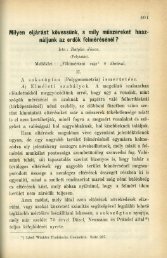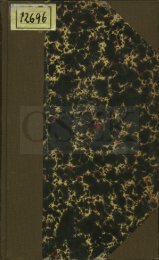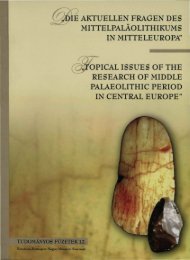Hungarian-Mesopotamian Dictionary (HMD)
Hungarian-Mesopotamian Dictionary (HMD)
Hungarian-Mesopotamian Dictionary (HMD)
Create successful ePaper yourself
Turn your PDF publications into a flip-book with our unique Google optimized e-Paper software.
ALFRÉD TÓTH : HUNGARIAN-MESOPOTAMIAN DICTIONARY (<strong>HMD</strong>)<br />
<strong>Hungarian</strong><br />
Proto-Finno-Ugric<br />
Sumerian<br />
<strong>Hungarian</strong><br />
Proto-Finno-Ugric<br />
Sumerian<br />
<strong>Hungarian</strong><br />
Sumerian<br />
<strong>Hungarian</strong><br />
Proto-Uralic<br />
Sumerian<br />
<strong>Hungarian</strong><br />
Sumerian<br />
<strong>Hungarian</strong><br />
Sumerian<br />
<strong>Hungarian</strong><br />
Proto-Finno-Volgaic<br />
Sumerian<br />
<strong>Hungarian</strong><br />
Proto-Uralic<br />
Sumerian<br />
<strong>Hungarian</strong><br />
Proto-Ugric<br />
Sumerian<br />
szén “coal”<br />
*śine “charcoal”, *ś8ne “tinder”<br />
šeĝ (261x: ED IIIa, Old Akkadian, Ur III, Old Babylonian, unknown) wr. šeĝ6<br />
“to cook; to fire (pottery)”<br />
szép “beautiful, handsome, pretty”<br />
*śeppä “clever”<br />
šab (25x: Old Babylonian) wr. šab “to trim; to make clear”. Since a participle in<br />
the sense of inflectional languages does not exist in Sumerian (non-finite verbal<br />
forms lack prefixes and suffixes, cf. Edzard 2003, p. 130), šab means also<br />
“trimmed, made clear” and thus “beautiful”.<br />
szeplő “freckle”<br />
zib (16x: ED IIIb, Ur III) wr. za3; zib “a mark; mark, token; colour, paint”<br />
szer “instrument, appliance; material, means; order, succession”, -szer/-<br />
szor/-ször “... times”<br />
*śerз “order, progression, series”<br />
šar (245x: ED IIIa, Ur III, Old Babylonian) wr. šar2; šar; šar2-šar2 “totality,<br />
world; (to be) numerous; 3600”<br />
szérű “barn floor, threshing yard”<br />
šu rah (13x: Ur III, Old Babylonian) wr. šu rah2 “to beat; to knead”<br />
szesz “alcohol, spirit”<br />
ses (42x: ED IIIa, ED IIIb, Ur III, Old Babylonian, unknown) wr. ses “(to be)<br />
bitter, brackish”. Obviously, it concerns beer; there are not less than 12<br />
denominations for “beer”.<br />
szidni “to scold”, szitkozódik<br />
*śoδa(-), *śoδ’a(-), śota(-) “battle, strife, war; to battle, to fight”<br />
šud (115x: ED IIIa, ED IIIb, Ebla, Old Akkadian, Early Old Babylonian, Old<br />
Babylonian, unknown) wr. šud3; šu-tu; šudx(|KA.ŠU|) “prayer, dedication;<br />
blessing”. Semantically, cf. Latin sacer “holy; damned”<br />
szíj “strap”<br />
*ś8wз “draught-cord”<br />
sa (68x: Old Babylonian) wr. sa “gut; sinew, tendon; string”<br />
szik “natron, alkali”<br />
*ć8kkз “salt”<br />
sig (343x: ED IIIa, ED IIIb, Old Akkadian, Lagash II, Ur III, Old Babylonian,<br />
1st millennium) wr. sig “(to be) weak; (to be) low; (to be) thin; (to be) narrow”.<br />
“weak” concerning the soil means dry, and natron-soil is dry, which makes the<br />
etymological connection to aszik, aszú (v.s.). Thus, the meaning of the PU<br />
form is wrong.<br />
___________________________________________________________________________________<br />
© Copyright Mikes International 2001-2007, Alfréd Tóth 2007 - 120 -


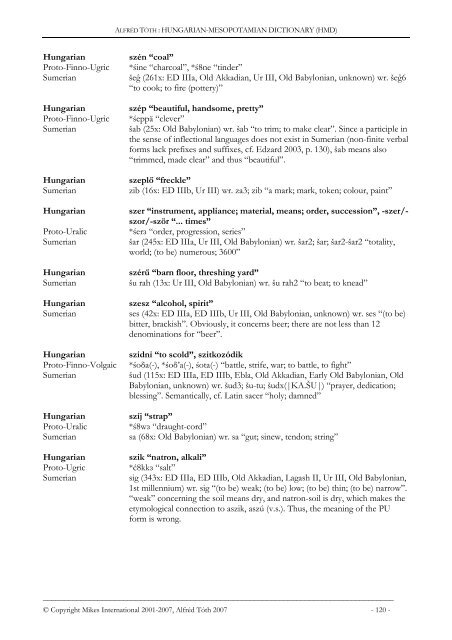


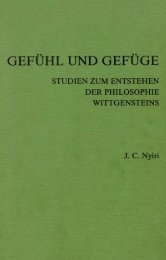
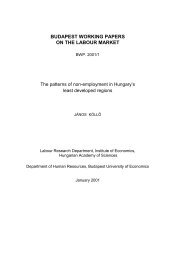

![Letöltés egy fájlban [4.3 MB - PDF]](https://img.yumpu.com/50159926/1/180x260/letaltacs-egy-fajlban-43-mb-pdf.jpg?quality=85)

